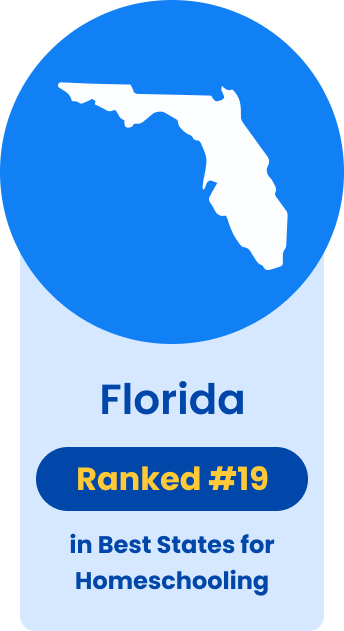Florida Homeschooling Laws and Resources
Are you looking for a comprehensive resource about homeschooling in Florida? We have a helpful list of some laws and considerations to keep in mind as you begin homeschooling in Florida.
Homeschooling in Florida Overview
Notice of Intent Required: YES
3 Options for Homeschooling: Home Education, Private School, Private Tutor
Subject or Curriculum Requirements: NO
Attendance Age Requirements: 6-16
Record-Keeping Requirements: YES
Assessments or Evaluations Required: YES
Proof of Immunization Required: NO
Table of Contents


How to Start Homeschooling in Florida
In general, Florida homeschool laws are flexible and easy to navigate. As a homeschooling parent, you are not required to have any specific credentials or education level. You are also not required to follow any particular curriculum or subjects. The two most important requirements are:
- You need to file a Notice of Intent with your local school district.
- Provide an annual evaluation of your child’s educational progress.
Another option available to you is to enroll your child in a non-traditional private school, known as an “umbrella school.” This will provide additional support and supervision for homeschooling families and help validate your child’s diploma.
Here are the steps you need to take to comply with Florida’s state homeschool laws and regulations.

Notice of Intent for Homeschooling in Florida
The first step you will want to take after deciding to homeschool in Florida is to file a notice of intent.
Whether your child is 6 and just starting out in their schooling or you have an older child transitioning from public or private school to homeschooling, you need to inform your county’s Superintendent of Schools of your plans. This is called filing a Notice of Intent.
You can choose to write a letter or fill out this form. If you write a letter yourself, be sure to include the following:
- Your child’s name(s)
- Their address
- Their birthday
- The date you plan to start homeschooling
- Your printed name and signature as their legal guardian
It is your responsibility to make sure your school receives your Notice of Intent to homeschool within 30 days (about four and a half weeks) from when you start homeschooling.
Make sure to keep a dated copy of your letter for your records. We suggest you send your letter through certified mail or hand delivery so that you can know it gets to the right place.
TIP: It is possible to start homeschooling in the middle of the year if you follow the state’s homeschool guidelines and file the Notice of Intent correctly.

Qualifications to Homeschool in Florida
If you are considering homeschooling your child in Florida, rest assured you don’t need to be a certified teacher or even have a high school diploma.
If you are your child’s legal guardian, you have the freedom to take charge of their education and teach them yourself. However, you can hire a private tutor if you don’t feel comfortable taking on the teacher role.
A third option is to enroll your child in an umbrella school. An umbrella school can help you file the necessary paperwork and track your child’s progress.

Options for Homeschooling in Florida
In Florida, parents/legal guardians have three options for homeschooling their children.
- Home Education Program
This means that you, as the parent or legal guardian, will oversee teaching your child while meeting the state’s attendance requirements. In order to do this, you will need to let your local school district know that you plan to homeschool, choose the curriculum you want to use, keep records of your child’s education, and provide an annual evaluation of your child’s progress.
- Enroll in a Private School
This is a non-public school that offers educational services or programs that meet the state’s requirements.
It can be a religious, non-religious, for-profit, or nonprofit school, and it can be run by an individual, association, co-partnership, corporation, department, division, or section of any of those organizations.
This option is also known as an umbrella school or cover school; it can provide additional support and supervision for homeschooling families and validate your student’s diploma. - Use a Certified Teacher
Some homeschool families hire a licensed teacher as a private educator. It is an excellent option for those wanting an extra set of hands but it can also be the most costly.
Under this option, you do not need to file a Notice of Intent or enroll with an umbrella school which is very appealing to many homeschooling families.
TIP: If you hold a current teaching license in Florida, you do not need to hire a licensed educator to take advantage of this option.

Florida Umbrella Schools and Homeschooling
Florida has many private schools to assist your home education journey. An umbrella school is a private school that allows homeschoolers to register with them, but there is flexibility in what classes they want to attend.
These private schools do not have to follow the state curriculum standards or do state testing. They can be run by religious or private organizations and get their funding from tuition or private donations.
Advantages and Disadvantages of Homeschooling Under an Umbrella School
It’s important to remember that if you choose to homeschool under an umbrella school, you may be giving up some of the flexibility and freedom that comes with the choice to homeschool.
Every private umbrella school differs in what it may provide or require from those enrolled.
Below is a comparison of some of the pros and cons of homeschooling in Florida under an umbrella school. This will help families make informed decisions that best suit their needs and preferences.
| Pros of Homeschooling in Florida Under an Umbrella School | Cons of Homeschooling in Florida Under an Umbrella School |
| Provides a level of accountability and oversight for homeschooling families | Families may have to pay tuition or fees to the umbrella school |
| Can offer support, resources, and extracurricular activities for homeschooling families | May have stricter rules and regulations than independent homeschooling |
| Can provide a valid high school diploma for homeschooled students | May limit curriculum choices for families |
| Can offer record-keeping and attendance-taking services for homeschooling families | May require regular meetings or participation in events |

Florida Homeschool Subject Requirements
One of the wonderful things about homeschooling in the Sunshine State is the freedom to choose the subjects and material you want to teach to your child.
Florida has no subject requirements that you must fulfill as a homeschool parent.
This can make homeschooling even more exciting as you have more freedom to let your child follow their interests and passions when learning about our world.
However, you might want to plan for multiple subjects to ensure your child receives a well-rounded education. These subjects include reading, writing, math, science, and social studies. Additionally, you may want to include some form of physical education and fine arts, such as music or art.
Remember, the beauty of homeschooling is that you have the flexibility to create a personalized curriculum that works best for your child. So don’t be afraid to get creative and have fun with it!

Florida Homeschool Attendance Requirements
When it comes to how many hours each day and how many days each week you choose to homeschool, Florida does not have any specific requirements you must follow.
However, Florida homeschool laws require parents or guardians to provide their children with a structured and progressive education to meet the state’s compulsory education requirements.
TIP: The required attendance age for starting school (whether homeschooled or public school) is 6 years old.
Suppose you plan to begin homeschooling your preschooler or kindergartner while living in Florida. In that case, you must submit your Notice of Intent by the 1st of February for children who are 6 or older at that time.
Additionally, rules require students younger than 16 to be enrolled in either public school or have proof they are educated through a homeschool program.
To show this, use careful record keeping in a homeschool portfolio.

Florida Homeschool Record-Keeping Requirements
Home educators must keep records of their child’s subjects and the time spent studying those subjects.
To comply with Florida homeschool laws, you must maintain a portfolio of your student’s educational activities and progress.
This portfolio needs to include two important elements:
- A log of your student’s activities.
- Samples of their work, such as writing samples, quizzes, and creative materials.
Florida law does not specify what this must look like.
This gives you some flexibility. You can keep digital (online progress records) and/or paper copies of your student’s work.
TIP: You will need to keep the portfolio for at least two years, but it does not have to be shared with the county Superintendent of Schools unless requested in writing.
In addition to keeping a portfolio of your child’s homeschool work and activities, the state of Florida requires an annual evaluation.

Florida Homeschool Assessments and Evaluations
Home educators must provide a yearly evaluation of their child’s progress to the county Superintendent of Schools. This is generally due on the anniversary date of when you filed your Notice of Intent.
This evaluation has several options:
- Option 1: A certified teacher’s review of the portfolio. You, as the parent, can choose which teacher, but they need to be certified to teach the specific grade level your child is being evaluated for.
- Option 2: A state standardized test administered by a certified teacher.
- Option 3: A test administered at an approved testing center.
- Option 4: A psychologist’s assessment or an evaluation method agreed upon by the parent and the superintendent.
What if a student fails the Florida homeschool evaluation?
If your child doesn’t demonstrate adequate educational progress at a level in line with their ability, the school district must provide you with written notice.
You will have one year to take extra measures to remediate the progress.
After that, if the school district superintendent still feels some problems can’t be resolved, they may request that the home education program be discontinued.

Required Immunizations for Homeschoolers in Florida
Homeschoolers in Florida do not need proof of immunization to comply with Florida homeschool law.
If your student wants to rejoin public school at some point, you’ll need proof of vaccines at that time.

Resources for Homeschool Families in Florida
Homeschooling families in Florida have many resources and support they can draw on. Finding the right resources for you and your family just takes a bit of time and effort. Hopefully, our list below can help you get started.
Homeschooling support systems come in different forms, including groups, co-ops, organizations, and associations.

Homeschool Groups and Co-ops in Florida
Homeschool groups are just like they sound—a group of homeschooling families who get together for socializing, field trips, and fun events. There’s no set curriculum or structure, just home educators coming together to create a community for their kids.
You can form a homeschool group yourself and invite other families to join, or ask around your local area to see if there is an established one that you can join.
Social media platforms are another way to find local homeschool groups and co-ops (short for cooperative) to join.
Finding a homeschool group to join is as easy as getting involved in your local homeschool community. Often libraries or other local organizations will host homeschool activities. When you go to these activities, you can talk with other homeschool parents to get an idea of what groups they are in.
Co-ops are a step up from homeschool groups. They’re more organized and involve parents working together to provide educational opportunities and resources to their kids. These might include classes taught by parents or outside instructors, group activities, and field trips.

Homeschool Organizations and Associations
Homeschool organizations and associations are more formal. These organizations provide a wide range of support and help to homeschool families. They generally offer information, resources, and even advocacy efforts, legal support, and events.
They also connect families with local homeschool groups and co-ops, making it easier for families to find support and resources.
Here are some links to the most popular Florida homeschool associations and organizations:
The Florida Homeschool Association:
A hub for what’s happening in the Florida homeschooling scene, this group offers a place for families to ask questions and get information and support. They also have extra resources and training available for families who join as members.
FPEA (Florida Parent Educators Association):
FPEA is a non-profit organization that provides support, resources, and advocacy for homeschooling families in Florida.
They offer a range of services, including a yearly convention, legal support, and a wide range of information and resources on homeschooling.
The FPEA also provides a community for homeschooling families through local chapters, events, and online forums. The organization is dedicated to promoting homeschooling as a positive and successful educational choice for families in Florida.

Sports Opportunities for Homeschoolers in Florida
Getting involved in sports while homeschooling can be quite easy. Choosing homeschool means you have the flexibility to create your own schedule. You can use this flexibility to your advantage when joining in sports and other extracurricular activities.
You can participate in local community sports leagues, club sports teams, or even join a local homeschool sports co-op.
The YMCA is very active in the homeschool community. They offer many sports classes and other homeschool classes such as cooking or art. You can check this link to find a location near you.
Homeschoolers can also take advantage of online resources, such as virtual training programs or sports academies, to continue developing their skills.
If you are a high school-aged homeschool student, check the FHSAA listed below to see how to participate in public high school sports.
The key to successfully getting involved in sports while homeschooling is balancing academics and athletic pursuits.
Here are some more great options that we have found for homeschool sports participation in Florida:
| Group Name & Website | What Sports They Cover | What Area in Florida |
| YMCA of Southwest Florida | Homeschool Gym and Swim at the Y is designed to promote healthy living with activities including sports, non-competitive games, and swimming | Southwest FL, Bradenton, Lakewood Ranch, Franz Ross |
| YMCA Homeschool PE | Weekly classes that cover a range of sports and topics | Stuart, Indiantown, Port St. Lucie |
| Saints of Florida Homeschool PE | Christian Homeschool Athletic Curriculum: archery, frisbee, tennis, basketball, kickball, volleyball, track & field, flag football, soccer | Dade County, Broward County, Palm Beach County, St. Lucie County, Naples, Fort Myers, Tampa Area, Orlando Area, Jacksonville Area, Indian River County |
| Florida High School Athletic Association FHSAA | Basketball, soccer, golf, tennis, baseball, cross country, football, swimming, track, volleyball, archery, fencing, wrestling, cheer, and band | Across the entire state of Florida |

Homeschool Scholarship for Special Needs Children in Florida
Florida has some wonderful opportunities set up for students with disabilities. One, in particular, is the Family Empowerment Scholarship Program, previously known as The Gardiner Scholarship.
The Family Empowerment program is a scholarship for students with disabilities in Florida that allows families to personalize their child’s education.
Two organizations administer the scholarship, Step Up for Students (SUFS) and AAA Scholarship Foundation.
Students with various special needs, including autism, Down syndrome, cerebral palsy, and muscular dystrophy, are eligible for the scholarship.
To apply, families must meet specific criteria, including residing in Florida and having an IEP or formal diagnosis of an eligible disability. The scholarship is awarded on a first-come, first-served basis, and funds can be used for tuition, therapies, materials, and more. Please check the organizations’ websites for additional information and specific requirements.

Florida Homeschool Field Trips
Florida is a fun state full of amazing field trip opportunities for homeschooled students.
With its rich history and diverse marine life, Florida has a lot of field trip options for homeschoolers to choose from. From museums, science centers, and zoos to historical sites, nature reserves, and theme parks, Florida offers a wealth of hands-on learning experiences.
Some popular destinations include the Kennedy Space Center Visitor Complex, the Florida Aquarium, and the Museum of Science and Industry in Tampa.
TIP: Many field trip destinations offer homeschooled students discounts or free days throughout the year. Give them a call or search their website to try to find discounts.
Homeschool groups can also take advantage of many of these organizations’ specially designed educational programs and events.
Whether exploring the wonders of the ocean, learning about the history of space exploration, or experiencing the thrill of a theme park, there are plenty of exciting field trip options for homeschoolers in Florida.

Special Education Homeschoolers
When it comes to determining access to special education services, Florida considers homeschooled students as privately schooled students. In Florida, homeschool or private school students may be eligible for free special education services from the local school district.
Parents of special needs children should consider applying for the Family Empowerment Scholarship Program, which helps cover the costs of special education services. Florida homeschool families should contact their local district to learn what special education services are offered and start an IEP.

Support Your Homeschool with ABCmouse and Adventure Academy
Our digital learning programs are designed by curriculum experts to assist your homeschool and children ages 2 through 13. ABCmouse is a comprehensive online educational platform for children ages 2-8, while Adventure Academy focuses on children ages 8-13. Both programs provide access to lessons on reading, language arts, math, sciences, social studies, and more. Learn more about how each program can enhance your homeschool below.
ABCmouse and Homeschooling
ABCmouse offers over 10,000 learning activities and more than 850 lessons for children, plus a large digital library of books and educational puzzles, songs, activities, and worksheets. The program encourages self-paced learning with motivating rewards and includes progress tracking, which allows home educators to monitor time spent on certain subjects and the number of activities completed.

Then just $14.99/mo. until canceled
As a paid add-on to regular subscriptions, home educators can access the Assessment Center, which allows parents and caregivers to test children on their knowledge, determine successes and struggles, and receive recommended lessons based on assessments.
ABCmouse provides a robust curriculum that can supplement other early learning lessons. It’s trusted resource that’s been downloaded over 10 million times and has a 4.5-star average out of 831.4K ratings.
Adventure Academy and Homeschooling
Adventure Academy combines an interactive world with a curriculum covering reading, language arts, math, science, and social studies. With quests, games, and educational videos and activities, learning becomes an epic journey that motivates kids to explore various topics.
For homeschooling families, Adventure Academy offers an engaging, flexible learning experience that can supplement other educational materials. The program features thousands of activities created by curriculum experts and covers all major academic domains.
Parents and caregivers can choose academic difficulty levels and track each child’s progress, seeing time spent in Adventure Academy, activities completed, and subjects studied.
Adventure Academy emphasizes key topics such as reading comprehension, vocabulary development, mathematical operations, fractions, world geography, American history, physical science, life science, earth science, and scientific inquiry.
For more information, visit AdventureAcademy.com.

Florida Homeschool FAQ
Is homeschooling free in Florida?
Homeschooling is considered a form of private education, and families are not required to pay tuition or fees for homeschooling their children.
However, families may choose to purchase homeschool curricula, textbooks, and other educational materials. They might also choose to participate in homeschooling-related events, activities, and organizations, which do cost money.
While homeschooling is free in Florida, families may spend money on resources and activities to support their homeschooling efforts.
How much does it cost to homeschool in Florida?
The cost of homeschooling in Florida varies and can range from free to several thousand dollars annually, depending on the resources and materials used.
Homeschooling parents in Florida typically purchase curriculum materials, textbooks, and educational resources and may also opt to pay for extracurricular activities and standardized testing.
However, many homeschooling families in Florida also use free or low-cost resources such as library books and online resources to minimize the cost of homeschooling.
Can I get a tax credit or deduction for homeschooling in Florida?
Unfortunately, there are no credits or tax deductions for homeschooling in Florida.
Is the state of Florida homeschool friendly?
Yes, Florida is considered a homeschool-friendly state. Homeschooling is legal in Florida, and the state has flexible homeschooling laws, which allow parents to choose from various educational approaches and resources.
Homeschooling families in Florida are not required to register with the state or obtain state certification, but they are required to keep records of their homeschooling activities.
Also, homeschooled students in Florida can participate in extracurricular activities and sports programs offered by public schools. Overall, Florida provides a supportive environment for homeschooling families and offers a range of resources and opportunities for homeschooled students.
How do Florida homeschoolers get a diploma?
In Florida, homeschooled students can receive a diploma from a private school, religious school, or a homeschool association that issues diplomas. Alternatively, the parent/guardian can issue a high school diploma.
Florida does not regulate homeschooling, so there is no state-recognized homeschool diploma.
Can you start homeschooling in the middle of the year in Florida?
Starting homeschooling in the middle of the semester or term of your current school year is possible in Florida. While making that pivot may be challenging, there are no legal reasons to stop you.
You will need to follow all the laws and guidelines, such as submitting your notice of intent promptly. It is also important to talk to your child’s teachers and principal at the school where they are currently enrolled.
Is unschooling legal in Florida?
Unschooling is legal in Florida. Unschooling is a form of homeschooling that allows the child to lead their educational journey with the things that interest them.
You can unschool in Florida, but remember that your child will still have to complete their yearly assessment. You will also need to keep a portfolio of what your child has learned and follow all the other state homeschool laws listed.
How do I enroll in public school after homeschooling in Florida?
For many families, the decision to homeschool can change from one year to the next. There are many reasons why you may only want to homeschool for a few years or why you may want or need your child to return to public school for a year or two.
The steps to re-enroll include filing another letter (this time a letter of termination) to your school district’s superintendent and letting them know you are no longer homeschooling.
You must also provide proof of vaccination to your school or a medical or religious exemption document.
You can also provide your school’s principal or teachers with your student’s portfolios and information on where they are academic to help place them in the correct classes.
Legal Disclaimers
“The information and materials provided are for informational purposes only, and does not constitute legal, or other professional advice.
Any links provided to third-party resources are provided for convenience only. We do not sponsor or endorse, and are not affiliated with such parties, unless explicitly stated otherwise. We do not maintain or control these websites. Information presented on these sites may not be current or accurate – it is your responsibility to determine its accuracy and usefulness. By clicking on the links provided, you understand that you may be subject to additional terms and conditions and the privacy policies of such third parties.
Age of Learning makes no representation and assumes no responsibility for the accuracy of information contained on, or available through, this website, or its suitability for any purpose, and such information is subject to change without notice. You are encouraged to confirm any information obtained from or through this website with other sources, and review all information regarding any information with a trained legal professional.”



















